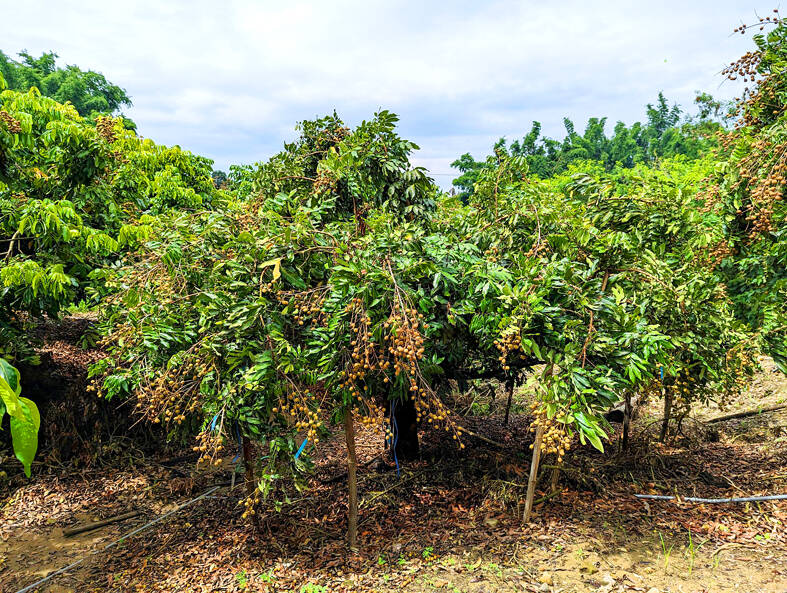The Taiwan Agricultural Research Institute’s Chiayi Agricultural Experiment Branch has developed an advanced flower induction technique using potassium chlorate to boost longan production during warmer winters.
Longan ranks among Taiwan’s top five fruit crops by cultivation area, with 10,437 hectares under cultivation and a total yield of 70,384 tonnes in 2023, the institute said.
Traditionally, longan has been a low-maintenance crop due to its high rate of growth and yield, and resistance to pests and diseases, but in recent years, flowering has declined significantly due to abnormal weather patterns and global warming, resulting in reduced harvests and revenue for farmers, it said.

Photo courtesy of the Taiwan Agricultural Research Institute
Since longan flowers are a major nectar source for bees in spring, poor flowering has also led to a drop in honey yields, it added.
By applying potassium chlorate to induce flowering, the rate of panicle formation during mild winters can be increased by 68 percent to 80 percent, the institute said.
The flower-induction technique was first developed in 1998 by Yan Chang-jui (顏昌瑞), a researcher at the National Pingtung University of Science and Technology’s Department of Plant Industry.
Yan observed that longan trees near temples produced more fruit. He discovered that potassium chlorate — a chemical found in firecrackers — had flower-inducing properties, the institute said.
However, the method was not widely adopted in Taiwan at the time, as potassium chlorate was classified as a controlled substance, limiting its accessibility, the institute said.
Additionally, early applications of the technique yielded limited results, because when the chemical was administered to soils, it could not be effectively absorbed by the deep-going root systems of longan trees, it said.
To improve the reliability of longan flowering during increasingly mild winters, the institute refined Yan’s technique by significantly reducing the amount of potassium chlorate administered to each longan tree and administering the chemical directly to the trees’ leaves rather than the soil, the institute said.
Similar to the effects of cold weather, potassium chlorate activates the flowering mechanism in longan trees, helping to stabilize yields, it said.
Spraying the chemical in early spring — typically in the first half of February — can ensure timely flowering and consistent production, especially following a warm winter, it added.
The method also enables early flowering and harvests the following year, helping farmers avoid the typical market glut during peak season and potentially boosting their income.
Applying potassium chlorate to induce longan flowers not only benefits fruit growers, but also supports the beekeeping industry, as longan blossoms are a major nectar source in spring, it said.
With further application, the technique can play a key role in helping the nation’s agricultural sector adapt to the challenges of climate change, it added.

The Ministry of Economic Affairs has fined Taobao NT$1.2 million (US$36,912) for advertisements that exceed its approved business scope, requiring the Chinese e-commerce platform to make corrections in the first half of this year or its license may be revoked. Lawmakers have called for stricter enforcement of Chinese e-commerce platforms and measures to prevent China from laundering its goods through Taiwan in response to US President Donald Trump’s heavy tariffs on China. The Legislative Yuan’s Finance Committee met today to discuss policies to prevent China from dumping goods in Taiwan, inviting government agencies to report. Democratic Progressive Party Legislator Kuo Kuo-wen (郭國文) said

The Ministry of Economic Affairs has fined Taobao NT$1.2 million (US$36,900) for advertisements that exceeded its approved business scope and ordered the Chinese e-commerce platform to make corrections in the first half of this year or its license would be revoked. Lawmakers have called for stricter supervision of Chinese e-commerce platforms and more stringent measures to prevent China from laundering its goods through Taiwan as US President Donald Trump’s administration cracks down on origin laundering. The legislature’s Finance Committee yesterday met to discuss policies to prevent China from dumping goods in Taiwan, inviting government agencies to report on the matter. Democratic Progressive Party

Taiwan and its Pacific ally Tuvalu on Tuesday signed two accords aimed at facilitating bilateral cooperation on labor affairs, according to Taiwan’s Ministry of Foreign Affairs (MOFA). The governments inked two agreements in Taipei, witnessed by Foreign Minister Lin Chia-lung (林佳龍) and visiting Deputy Tuvaluan Prime Minister Panapasi Nelesone, MOFA said in a news release. According to MOFA, the agreements will facilitate cooperation on labor issues and allow the two sides to mutually recognize seafarers’ certificates and related training. Taiwan would also continue to collaborate with Tuvalu across various fields to promote economic prosperity as well as the well-being of their

Sung Chien-liang (宋建樑), who led efforts to recall Democratic Progressive Party (DPP) Legislator Lee Kun-cheng (李坤城), was released on bail of NT$80,000 today amid outcry over his decision to wear a Nazi armband to questioning the night before. Sung arrived at the New Taipei District Prosecutors’ Office for questioning in a recall petition forgery case last night wearing a red armband bearing a swastika, carrying a copy of Adolf Hitler’s Mein Kampf and giving a Nazi salute. Sung left the building at 1:15am without the armband and covering the book with his coat. Lee said today that this is a serious